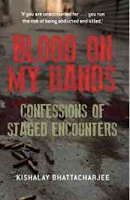On the road to nowhere: a day with people who don’t exist.
(An edited version of this article was published in The Lucknow Tribune.)
On the road towards Muzzafarnagar, my eyes somehow expect to see desolation associated with the name in recent times, but the cheery road flanked by the green sugarcane fields could be straight out of a Karan Johar film. Small shops, dusty roads, the local mithai shop with colorful character next to us eating an entire plateful of ladoos.
Finally, we reach our destination… a field in the middle of nowhere. A simple board “rahat shivir-Jolla” takes us into enter the typical IDP (internally displaced people) camp: tents from Oxfam, women sitting outside in the sun, outdoors kitchens. Except it is not a relief camp; it doesn’t exist officially; the state govt claims that there are no refugees and everyone has returned to their homes. So the nearabout 150 families living here don’t exist in official records and the camp is run by charities and NGOs who give them food and shelter.
As soon as we enter, we are surrounded by the residents, who are used to random strangers listen to their grievances and walking off. They point to the leaking roofs, freezing winter rain, their children who have no school to attend. Their main grievance is about the lack of compensation from the government. They want to move on but not a single voice talks of returning ‘home.’ “I went back one day and they told me kaat dalenge wapas aaye to” says one old man. Others nod in agreement.
As more and more people join our impromptu public meeting, there are tales galore of the policemen who refused to register their complaints, those who insult them even now and of the Hindu SHO who took a bullet to protect the Muslims. The brave Hindu police officer crops up frequently in the conversation, as if to reassure themselves that some in the administration are still beyond the religious divide.
Some voices are subdued, others completely befuddled. “we used to live so peacefully, Muslims and Jats, always have, why did all this happen?” says a older woman whose voice reflects disbelief. We keep quiet. Answers of political machinations which seem so convincing in the media and the courts, seem inadequate here in the face of confused misery.
A line we hear constantly is of “it’s mainly the Muslim organizations which are helping us,”. Though it is said without any rancour towards any other religion, it cuts me deep, specially since my colleagues and I are from an assertively secular organization. But the truth is that the unofficial camps are mainly being fed and clothed by Islamic charities as proclaimed on the signboards; and secular/Hindu charitable organizations are few. “Hindus helping hindus; and muslims helping muslims, is this what India's secularism has been reduced to?" i wonder helplessly.
Our next stop is at another picturesque rural scene. Pretty young girls follow me with shy smiles. Suddenly I come face to face with a beautiful young woman. Her face is covered with a shawl, but her light colored eyes hold no fear. Somebody whispers, “She was gang raped during the riots”. The pretty young woman is one of those who has decided to take on the criminals and is fighting in courts for justice. She starts to talk; then stops, “Go away. All this is not for your ears” she says to the bunch of little girls, but they refuse to budge, little pitchers bursting to hear . But between her whispers, and our mutual desire to shield the little rosy faces from the horrific reality of human beings, we don’t talk about ‘that day’ anymore. She just says “we’ll keep fighting for justice. We won’t let go”.
I spend the rest of the time smiling at the gregarious kids and chatting about their studies and films. Finally one of the gaggle of girls and women surrounding me, ask me with a cheery confidence. “Aap Musalmaan hain na?” and my eyes which remained dry all the while I was listening to tales of killing and rapes, humiliation and hopelessness, feel the pricking of tears. For these fellow indians, friendliness and warmth has become associated with a specific religion. Could there be a greater failure and tragedy for a country?.
“Nahin! Hindu hoon,” I smile reassuringly, as if I were some sort of representative of my religion. As if by proclaiming the religion of my forefathers I will convince them of the friendship and good heartedness of all the Hindus in the world. Alas! Mine was the wrong answer. The eyes still smile at me, but the conversation dries up. I didn’t pass the test of the new lesson Muzzafarnagar has taught them. That friendliness and warmth need to be distinguished on religious lines. I hope someday we can overturn this cynical lesson for them. But not now. We leave the displaced who don’t exist, hoping that justice and peace will not prove to be as illusionary as the camps for them.

Comments